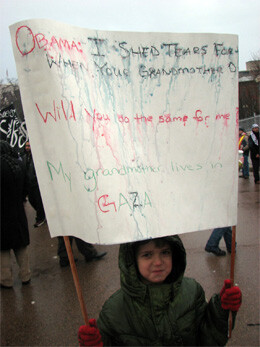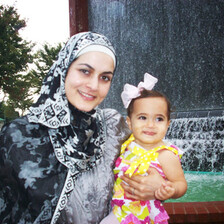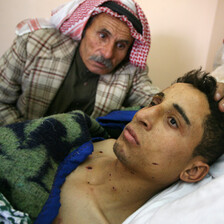Durham, United States 12 January 2009

The author’s nephew participates in the Washington, DC rally. (Laila El-Haddad)
Two Duke graduate students accompany us, one a Palestinian from Lydd, the other a Syrian Fulbright scholar.
On the way, Yousuf abruptly interrupts our banter to ask whether his grandfather is going to die in Gaza. He asks me to tell “them” not to shoot him.
I ask him to make a dua, to ask God to keep him — to keep all of Gaza — safe.
“That is stronger than any bullet,” I explain.
We arrive a little late, and have to march extra quickly to catch up with the group of what was estimated to be 10,000 or so protesters. It is a diverse and civil crowd. Unfortunately, the weather was not so civil. By the end, we are drenched in freezing rain, my fingers as numb as Noor’s lips are blue, plastic parkas plastered to our wet faces.
We catch up with my brother and my nephew, Zade, who is carrying a wet sign, its ink bleeding down it as though to simulate Gaza’s tears and blood. The sign read:
“Obama: I shed tears when your grandmother died. Will you do the same for me? My Grandmother lives in Gaza.”
After complaining he was freezing, his mother promptly told him “freezing is better than dying.” He agreed.
Later, he proudly told his grandfather he marched two hours in the freezing rain for Gaza.
We walked by the hotel the president-elect was staying in (sources say he was busy eating chili), and ended up in front of the White House before heading back to North Carolina.
On the way, I receive the dreaded 9pm call from my father. My heart skipped a beat — late night calls always bear bad news.
“More bombings, I can’t sleep. Israeli navy gunships are bombarding Gaza City’s Tel al-Hawa neighborhood, you know where Amo Musab lives, where he built his new house,” he says, referring to his cousin.
“The suburb is in flames. Residents are calling out to the Red Cross but they can’t reach them, and they say they are bombing with firebombs or something; there is a thick black smoke descending on them, choking people,” he continues calmly.
I immediately have my brother update my Twitter account for me. I feel better, empowered in whatever incremental way, knowing I am broadcasting this piece of information that is at once senseless and meaningful to the world. My brother struggles to condense terror and death and panic to 140 characters.
We continue speaking.
I learn that my cousin’s father-in-law has been hurt. His house in northern Gaza was hit by Israeli forces, then bulldozed to the ground. He was arrested, blindfolded and tortured — including made to fall off stairs, fracturing several ribs. He then had to walk an hour to Gaza City’s Sheikh Ijleen neighborhood. His wife was also forced to leave in her pajamas in the middle of the night and walk alone to the city.
I talk to my father until the bombing subsides — until anther hour. Sometimes we don’t say anything at all. We simply hold the phones to our respective ears and talk in silence, as though it were an unfamiliar technology. As though I can shield him from the hell being unleashed around him for those few minutes. However absurd it sounds, we feel safe somehow; reassured that if something happens, it will happen while we stand together.
Laila El-Haddad is a Palestinian freelance journalist, photographer, and blogger (http://a-mother-from-gaza.blogspot.com/) who divides her time between Gaza and the United States.
Related Links





